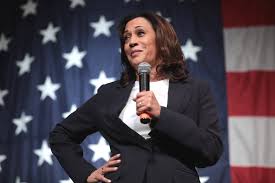What Kamala Harris Being Vice President Means to Women of Color

Photo obtained from Wikimedia Commons
Kamala Harris. The first woman and woman of color to obtain the position of Vice President Elect.
December 8, 2020
On November 7, 2020, former senator Kamala Harris was elected Vice President, marking a stamp in history.
As women of color, we constantly have to tackle not only racial issues but gender issues as well. Intersectionality is the concept of two or more identities that create different degrees of discrimination and privilege such as race, gender, class, sexuality, religion, disability, etc). However, it can often be dismissed within specific movements such as the entire feminist movement, which is predominantly run by white women, because they might be black, indigenous, latinx, asian, etc. They can even deal with racialized sexism within their own communities. Our stories are more likely to be overlooked because of the many barriers that come with race and gender.
Former President Barack Obama being a black president did not fix all the human rights issues within the US, but that does not mean he did not hold a legacy. If anything, he brought some type of hope to black children and black youth. The closest woman to ever got to be a presidential candidate for their party was former secretary Hilary Clinton, back in the 2016 Presidential Election. Despite her being a white woman, she still got a lot of backlash for solely being a woman running for president. She had to fight off the doubts, stigmas, and rumors to be respected in politics. So for Harris to not only be the first woman out of all men but to be a black and south-Asian woman out of mostly white men, positioned in a high role as vice president, is an accomplishment.
Even though I have always felt comfortable being a black woman, there have been moments where I have felt incredibly dismissed and even hopeless at times because of the harmful stereotypes and discrimination that society has placed on me. I would indirectly have to prove myself to others that I am not aggressive or obnoxious, that I am just expressive and passionate about my future and what I want to contribute to the world. Harris’ VP position taught me that I will be able to beat the system if I made my own mark and helped other black women such as myself.
Now that it is for certain that Harris is elected vice president, she has the responsibility to help out black and brown communities, considering she identifies more with them. Her position does not fix everything and erase the systemic inequalities in America, but it brings hope that should be rightfully celebrated. It is undoubtedly a pivotal mark in history.


AbbyMMS • Jan 5, 2021 at 9:22 pm
I really liked this article–you had so very insightful commentary, especially about race and whitewashed feminism